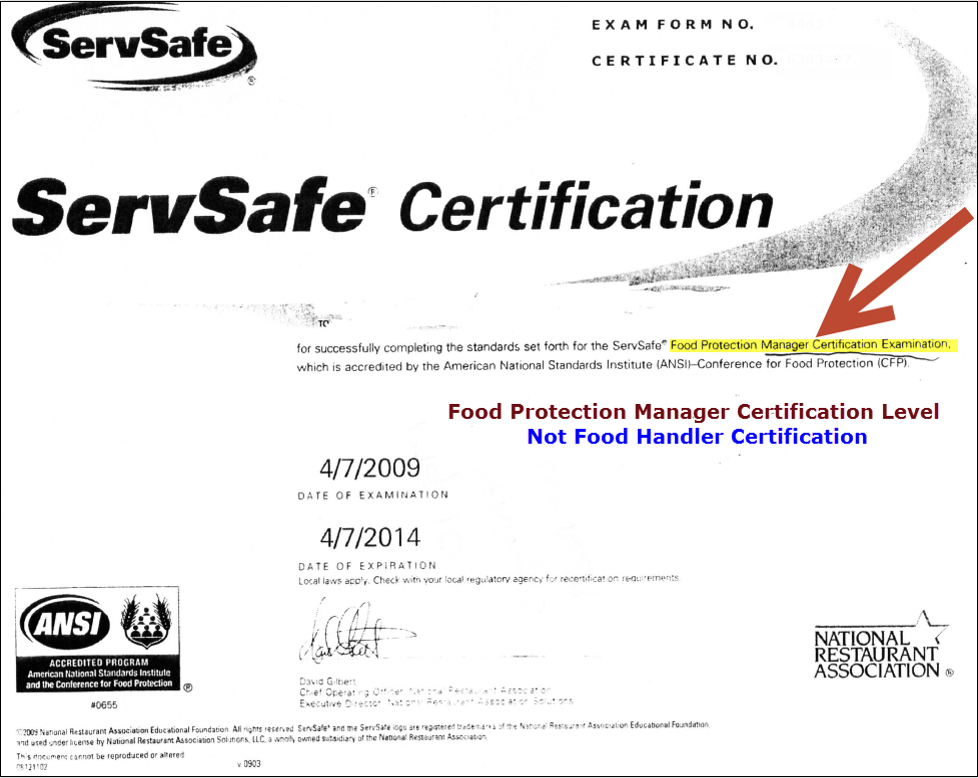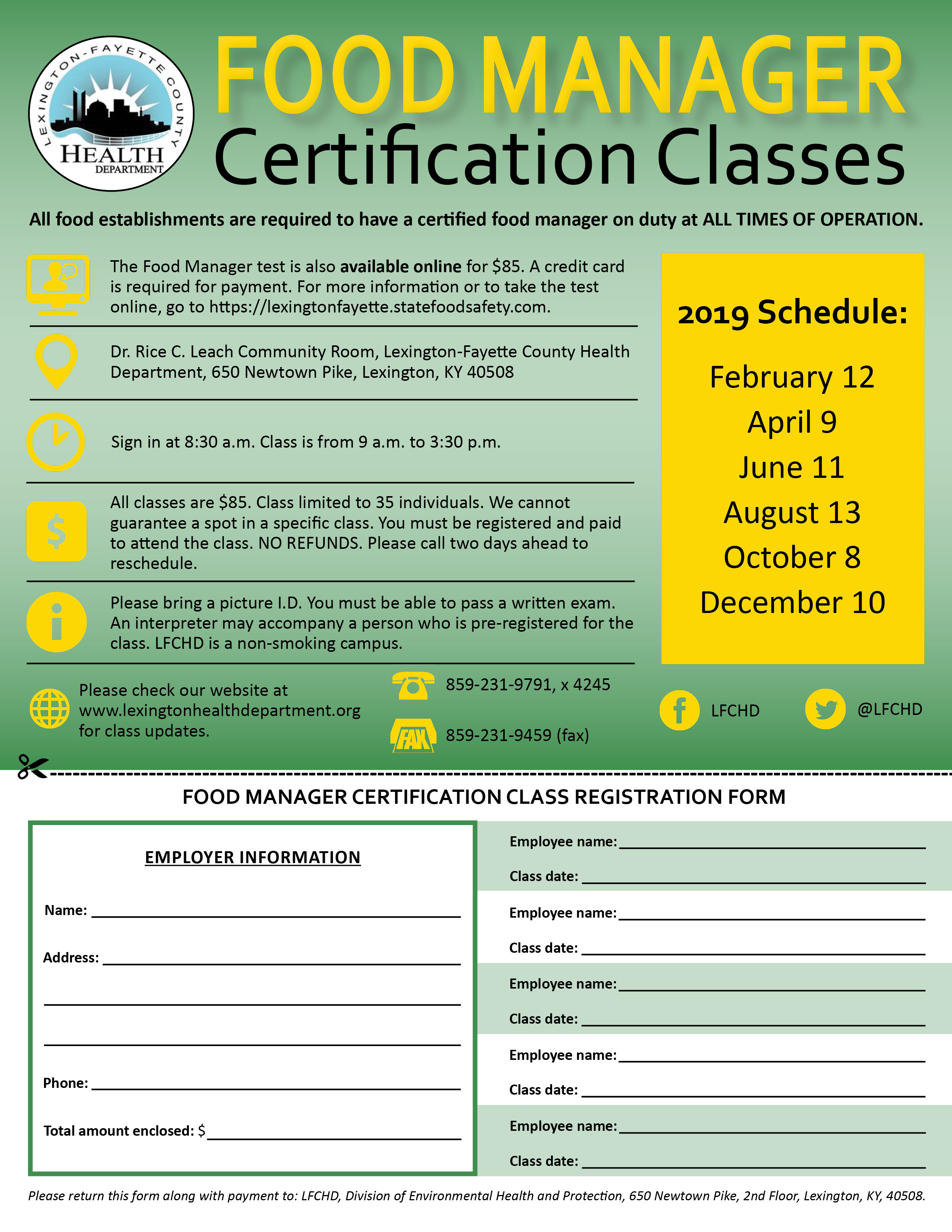What You Need to Find Out About the ServSafe Food Manager Certification Process
What You Need to Find Out About the ServSafe Food Manager Certification Process
Blog Article
Professional Training for Food Supervisor Accreditation Made Simple
The relevance of food manager certification can not be downplayed, specifically in an era where food safety is extremely important. Specialist training programs have progressed to enhance the certification process, offering crucial understanding and sensible abilities required for efficient food administration.
Importance of Food Manager Qualification
The relevance of Food Supervisor Accreditation can not be overstated in today's food solution sector. This qualification represents that food supervisors have the necessary understanding and skills to make certain food safety, keep health requirements, and maintain regulatory compliance. In an age where foodborne health problems can have extreme repercussions, the duty of a qualified food supervisor ends up being critical in safeguarding public wellness.
Food Manager Accreditation not only equips people with the competence to recognize and alleviate food security threats however also enhances the integrity of the facility. Clients are significantly discerning; they look for assurance that their eating experience is secure and hygienic. Qualification functions as a mark of professionalism and trust that can draw in and maintain consumers.
Additionally, a certified food supervisor can lead staff training, fostering a culture of safety and liability within the work environment (ServSafe Food Manager Certification). Spending in Food Manager Accreditation is a financial investment in quality, safety, and the total success of food solution operations.
Review of Specialist Training Programs
Professional training programs for food supervisor certification are created to supply extensive education and learning on food safety techniques, governing compliance, and risk monitoring. These programs intend to equip food service experts with the understanding and skills necessary to make certain safe food handling and prep work in numerous setups, consisting of dining establishments, catering services, and institutional food procedures.
Normally, expert training programs include both sensible and academic parts, permitting individuals to engage with real-world circumstances. The educational program often includes essential subjects such as foodborne illnesses, correct food storage space strategies, hygiene procedures, and staff member training techniques. These programs are frequently updated to straighten with the latest sector requirements and laws, ensuring that participants obtain pertinent and existing info.
Many programs supply versatile delivery approaches, including in-person classes, online programs, or a hybrid method, satisfying different knowing choices and routines. Upon effective conclusion, individuals normally obtain accreditation, which is typically acknowledged by neighborhood health and wellness divisions and governing firms, boosting their profession leads within the food service market. Generally, expert training programs play a critical role in cultivating a society of food security and compliance amongst food managers and team.
Secret Topics Covered in Training
Food safety is a critical emphasis in food supervisor certification training, including a selection of important topics that make certain participants are well-equipped to deal with food securely. Among the primary subjects covered is the value of individual health, that includes proper handwashing strategies and the significance of keeping cleanliness in cooking areas.
In addition, the training addresses foodborne illnesses, outlining the numerous pathogens that can pollute food and the signs linked with these diseases. Participants discover about the problems that advertise microbial growth, which is crucial for stopping break outs.
Temperature level control is another essential topic, highlighting the secure food preparation, cooling, and storage temperature levels needed to lessen risks. The training also covers look at this site cross-contamination avoidance approaches, making sure that raw and prepared foods are dealt with appropriately to avoid damaging communications.
Moreover, food safety and security regulations and guidelines, such as those stated by the FDA and local health departments, are reviewed to give a detailed understanding of compliance demands. Last but not least, efficient bug control steps are examined to protect food facilities from infestations that can jeopardize security. Collectively, these topics lay a strong structure for risk-free food administration methods.
Benefits of Expert Training
Exactly how can professional training boost food safety and security practices within an establishment? Specialist training furnishes food supervisors with thorough expertise of food safety laws, sector requirements, and finest practices. This foundational understanding is critical for maintaining a risk-free and tidy food preparation environment, ultimately reducing the danger of foodborne ailments.
Moreover, specialist training fosters an aggressive approach to food security by stressing safety nets and threat evaluation. Supervisors trained by market experts can successfully identify possible threats and implement approaches to mitigate them. This not just secures consumers however also improves the facility's reputation and dependability.
Furthermore, professional training encourages a society of continuous improvement. Food supervisors that participate in continuous education and learning are much better prepared to adjust to new laws and trends in the food solution sector. This versatility can cause boosted functional efficiency and price savings.


Steps to Achieve Accreditation
Achieving accreditation in food monitoring needs a systematic technique that includes numerous vital actions. Initially, people have to choose a recognized training program that uses detailed coursework in food security, monitoring, and hygiene principles. These programs commonly offer valuable resources, consisting of research study products and technique tests
Next, prospects must proactively take part in the training sessions, whether in-person or on the internet, to boost their understanding of important topics such as foodborne health problems, personal hygiene, and correct food storage space techniques. Involvement in discussions and sensible exercises can additionally enhance understanding.

As soon as adequately ready, candidates can take the examination and schedule. Successful completion usually requires accomplishing a details passing rating, which shows a thorough understanding of food safety and security requirements.
Final Thought
In summary, professional training for food supervisor qualification plays a check that vital role in making certain food safety and compliance with governing criteria. The structured programs offer essential understanding and practical skills essential for taking care of foodborne diseases and hygiene protocols effectively. By assisting in ease of access and enhancing profession potential customers, these training initiatives contribute substantially to public health and wellness. Inevitably, attaining food supervisor accreditation via specialist training not only raises private competencies but likewise fosters a much safer food setting for all.

Professional Check This Out training outfits food managers with thorough understanding of food security guidelines, sector requirements, and finest practices.In recap, specialist training for food manager accreditation plays a crucial duty in making certain food safety and compliance with regulative standards (Safe Serve Manager). Eventually, accomplishing food manager certification via specialist training not only raises specific proficiencies however also cultivates a much safer food setting for all
Report this page